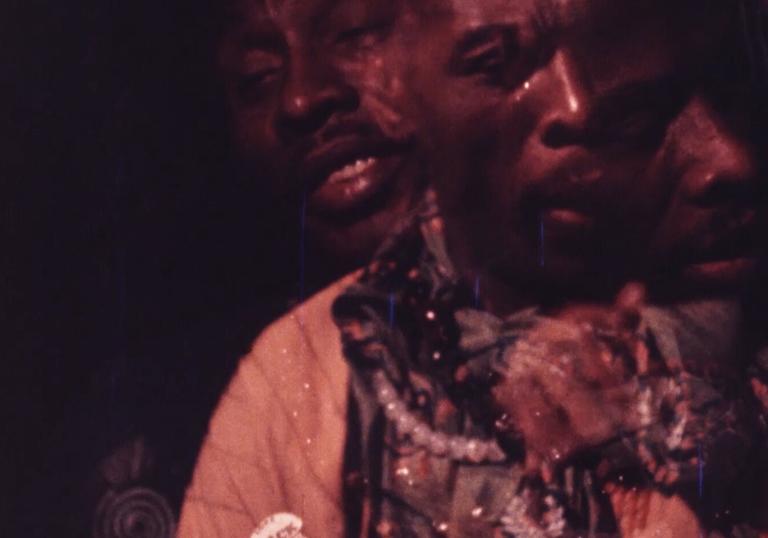Press room
Barbican Cinema launches Experiments in Film with the work of Edward Owens

Private Imaginings and Narrative Facts, Dir Edward Owens, USA 1966
Thu 13 Jan 6.15 pm, Cinema 2
www.barbican.org.uk/whats-on/2022/event/experiments-in-film-the-cinema-of-edward-owens
Barbican Cinema is pleased to present Experiments in Film, a new regular bi-monthly series focusing on experimental cinema, which pushes at the boundaries of what film is, and what it can be.
Launching on Thu 13 Jan with The Cinema of Edward Owens – with an introduction from Barbican Cinema Curator Matthew Barrington – each screening offers a rare chance to see experimental films by important artists, from classics to new and exciting emerging work. The Barbican is bringing these films to the foreground, and into the communal space of cinema, where viewing and discussion are so central to the experience of watching them.
Edward Owens (US, 1949-2009) was a queer African American artist who was working in painting, sculpture, and 8mm film at the Art Institute of Chicago in the 1960s. Encouraged by his teacher, the filmmaker Gregory Markopoulos, Owens moved to New York where he befriended the major artistic personalities of the day including Andy Warhol, Gerard Malanga, Marie Menken, Gregory Battcock and Charles Boultenhouse.
Over the next four years, Owens created a strikingly beautiful series of films. Depicting heartbreak, queer desire, and his own family, they displayed an increasing mastery of form, inspired by Markopoulos’s style but transformed into something purely his own.
This programme offers an opportunity to see all four of Owens’ films together for the first time in the UK. Owens was a teenager when he created these 16mm works, which reflect some of the purveying trends in late 60s experimental cinema, whilst remaining highly personal accounts of his environment; particularly in Private Imaginings and Narrative Facts and Remembrance: A Portrait Study, his better known works, which are portraits of his mother and her circle of friends.
His films are rare examples of a Black queer perspective and viewing them over five decades later, they remain a fascinating and fleeting portrait of an artist whose filmmaking career ended when he was only twenty years old. In 1970 Edwards left New York and has remained largely forgotten, until rediscovery by the American writer and curator Ed Halter in 2009, two months before he would pass away, age sixty.
Future Experiments in Film events will showcase the Lithuanian-American filmmaker, poet, and artist Jonas Mekas - a hugely influential figure within experimental cinema - during the centenary year of his birth; and a programme dedicated to emerging artists and the London-based Katharine Fry, whose work explores questions of unconscious states particularly related to the home.
Barbican Cinema Curator, Matthew Barrington comments:
“With Experiments in Film, we want to provide a fixed, year-round space for experimental cinema and select from rarely screened, scarce material, London based filmmakers and new material sourced worldwide, to showcase the best of this work. In the first session, we have decided to focus on Edward Owens, whose films haven’t really been shown in London before, and provide local audiences with the first opportunity to see the complete work of an important artist.
His films are reflective of that avant-garde, left-wing, experimental scene. But his identity as an African-American gay man also adds a certain element of difference to his engagement. I think his films are important in terms of portraiture and presenting a different image of African-American identity, which wasn’t so present or so seen at the time.”
Screenings
Tomorrow's Promise
USA 1967, 16mm, colour, silent, 45 min
Here Owens attempts to tell a story solely through the interaction between images, abandoning conventional narration. The resulting film is an elliptical, moody, experience of the tale of a doomed romance.
Remembrance: A Portrait Study
USA 1967, digital file, colour, sound, 6 min
A montage of images of the artist’s mother and her circle of friends and acquaintances juxtaposed with fragments of pop songs.
Private Imaginings and Narrative Facts
USA, 1966, digital file, colour, 6 min
A silent portrait of a series of individuals framed in interior seemingly domestic spaces. Owens mother again appears throughout the film.
Autre Fois J'ai Aimé Une Femme
USA 1966, digital file, colour, sound, 24 min
Owens’ first film contains a series of super impositions and fleeting images of bodies suggesting illicit desire and demonstrates a use of baroque lighting which occurs across the programme.
Upon viewing Autre Fois, Gregory J. Markopoulos wrote: "(Edward Owens) may well be one of the few for whom 'amateur' and 'professional' need have no significance whatsoever: true to his own native talents, with grim determination uncanny, whether the mind in the arts is for or against beauty or its opposite twin, chaos.
Ends
The Barbican believes in creating space for people and ideas to connect though its international arts programme, community events and learning activity. To keep its programme accessible to everyone, and to keep investing in the artists it works with, the Barbican needs to raise more than 60% of its income through ticket sales, commercial activities and fundraising every year.
Donations can be made here: barbican.org.uk/donate
Ian Cuthbert, Communications Manager - Cinema : [email protected]
Sarah Harvey, Barbican Cinema Press Consultant : [email protected]
